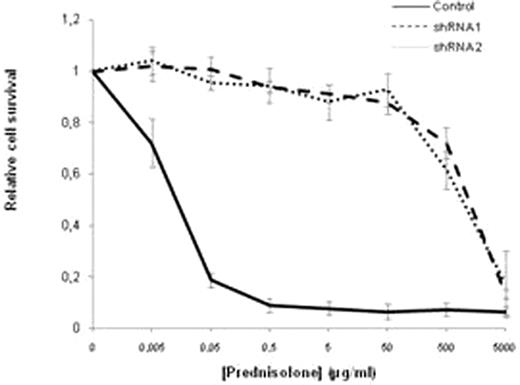Abstract
Abstract 3458
Poster Board III-346
By genome wide profiling we have found that about 10 % of pediatric pre-B ALL cases contain a (single copy) deletion of the B cell translocation gene 1 (BTG1) gene. BTG1 belongs to a family of potential tumor suppressor genes, which include BTG2, BTG3, TOB and TOB2. Proteins encoded by members of this gene family have been implicated in the induction of growth arrest or apoptosis in a variety of model systems. Moreover, BTG1 associates with and regulates the activity of the arginine methyl transferase PRMT1, a coactivator of nuclear receptor-mediated transcription. Hence we hypothesized that loss of BTG1 function, for instance due to deletion, may affect glucocorticoid induced therapy responses in ALL.
Using RNA interference, we find that loss of BTG1 expression decreases sensitivity of pre-B ALL cells to the apoptosis-inducing effects of synthetic GCs about 10,000 fold (Figure). This acquired GC resistance is accompanied by a greater than 10 fold reduction in GR protein expression as well as a (near complete) loss of GC-induced gene expression. Conversely, re-expression of BTG1 restores GC sensitivity by potentiating GC-induced GR expression. By chromatin immunoprecipitations using anti PRMT1 antibodies we show that PRMT1 is recruited to the GR gene promoter in a BTG1-dependent manner, consistent with a role for this arginine methyl transferase in the regulation of GR-mediated gene expression.
Together, our results demonstrate the importance of the BTG1/PRMT1 complex in regulating GR-mediated gene expression and reveal how deregulation of the this complex can give rise to GC resistance. Targeting of these coactivators as part of the GR regulatory circuitry could offer novel opportunities for improving the efficacy of GC based therapies in ALL as well as other hematological malignancies.
Figure: Survival of pre B leukemia cells expressing a control shRNA in comparison to cells expressing two independent BTG1-specific shRNAs (shRNA1 and shRNA2) following 3 days of prednisolone exposure.
Figure: Survival of pre B leukemia cells expressing a control shRNA in comparison to cells expressing two independent BTG1-specific shRNAs (shRNA1 and shRNA2) following 3 days of prednisolone exposure.
No relevant conflicts of interest to declare.
Author notes
Asterisk with author names denotes non-ASH members.


This feature is available to Subscribers Only
Sign In or Create an Account Close Modal